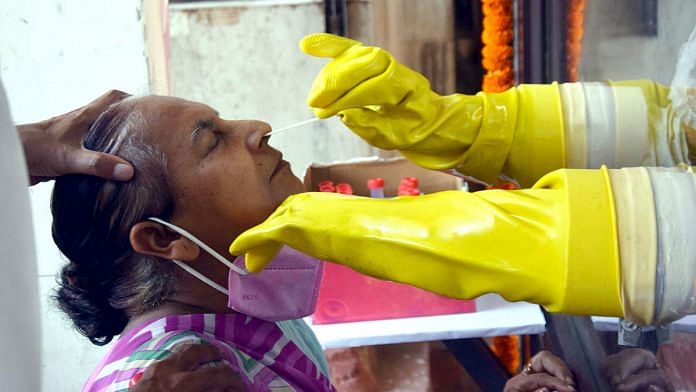New Delhi: Scientists across the world have been undergoing new research to throw light on the SARS-CoV-2 virus and ways to manage infections caused by it.
Here are some of the latest scientific studies on Covid-19.
Blood pressure drugs may improve Covid-19 survival rates
Drugs used to manage high blood pressure may help improve Covid-19 survival rates and reduce the severity of infection, a study has found.
Researchers from the University of East Anglia in the UK studied data from 28,000 patients who take antihypertensives — a class of drugs that are used to treat hypertension.
While patients with cardiovascular diseases are at particular risk of severe Covid-19 infection, there was concern at the start of the pandemic that medications for high blood pressure could be linked with worse outcomes.
The study, published in the journal Current Atherosclerosis Reports, found that the risk of severe Covid-19 illness and death was reduced for patients with high blood pressure who were taking Angiotensin-Converting Enzyme inhibitors (ACEi) or Angiotensin Receptor Blockers (ARB).
The team analysed data from 19 studies related to Covid-19 and ACEi as well as ARB medications. They compared data from coronavirus patients who were taking ACEi or ARB medications with those who were not. The study focussed on whether they were admitted to intensive care, required ventilation or died.
Also read: Israel develops new Covid pool testing method that can screen nearly 50 samples at once
Coronavirus in sewage water & impact on water resources
Wastewater containing coronaviruses may be a serious threat, leading to further infections, a new study has suggested.
A team led by researchers at the Ben-Gurion University of the Negev (BGU) in Israel evaluated studies on coronaviruses in wastewater and previous airborne infectious diseases, including SARS and MERS.
Their study, published in Nature Sustainability, said there was ample reason to be concerned about how long coronaviruses survive in wastewater and how they impact natural water sources.
The researchers have, however, also said there wasn’t enough knowledge to understand whether wastewater contains enough coronaviruses to infect people.
The study has suggested that sewage leaking into natural watercourses may lead to infection via aerosolised pathways. Even treated wastewater, dumped into lakes and rivers, can become sources of contagion.
Fruits and vegetables irrigated with wastewater that are not properly disinfected can also be an indirect infection route, the researchers have said.
2 proteins may help predict if Covid-19 infection will worsen
Scientists have identified two proteins that can reliably predict if a person with Covid-19 is likely to develop severe symptoms and their risk of death.
For their study, published in the journal Nature Medicine, researchers looked at four proteins known as cytokines that circulate in blood and are commonly associated with infections.
Two of these, called IL-6 and TNF-α, are associated with more severe forms of Covid-19 and death risk. The study suggests that these cytokines should be monitored in Covid-19 patients to identify those who are more at risk.
The team also studied how various treatment methods affected the levels of these proteins. They found that treatments with remdesivir or dexamethasone, which were recently found to benefit Covid-19 patients, could lower the levels of the two proteins.
Scientists study specific antibodies that could lead to Covid vaccine
Scientists have suggested that Covid-19 specific monoclonal antibodies may provide immunity to the respiratory system against the virus, paving the way for an effective vaccine.
In a study published in Nature Communications, scientists have spoken about the discovery of a human monoclonal antibody (MAB) which blocks the virus from binding to the ACE2 receptors in the respiratory tract.
Monoclonal antibodies are made by identical immune cells which are all clones belonging to a unique parent cell. The team had previously investigated antibodies in the gastrointestinal tract as a possible therapeutic to prevent gastrointestinal infections. They then wondered if similar anti-SARS-CoV-2 antibodies could produce immunity.
They found that an antibody, designated MAb362, can neutralise viral activity. These antibodies were more effective in binding to and neutralising the virus compared to the most common types of antibodies circulating in the body.
Also read: Why Covid-19 herd immunity may be closer than we believed so far



